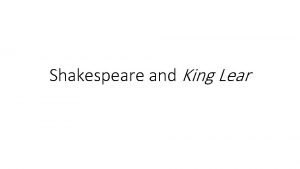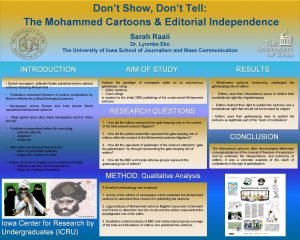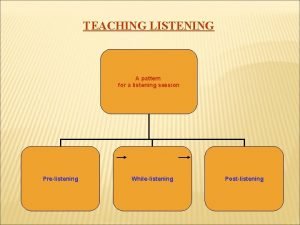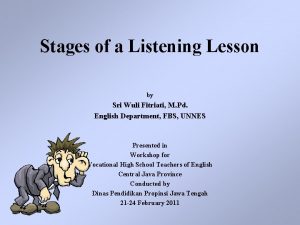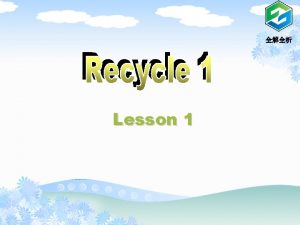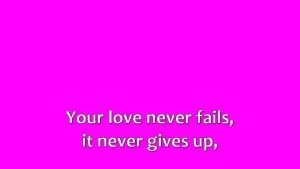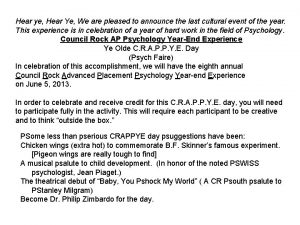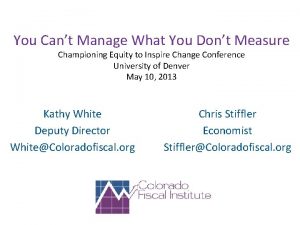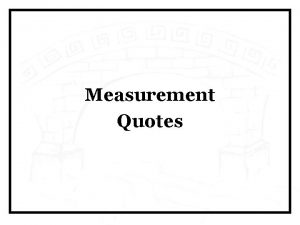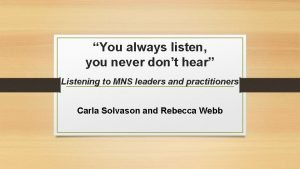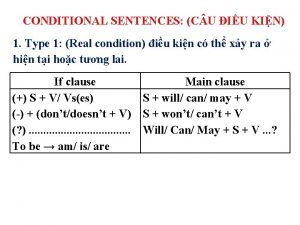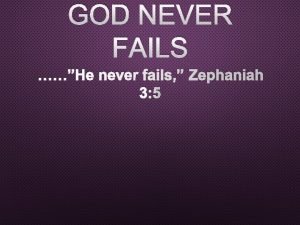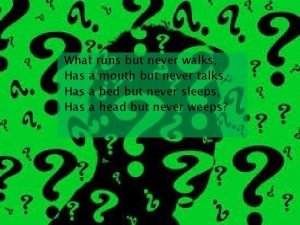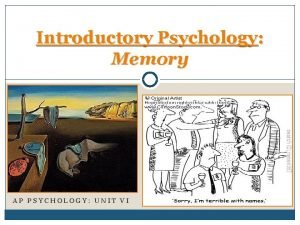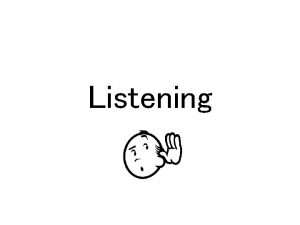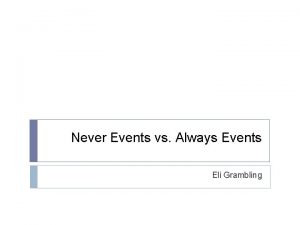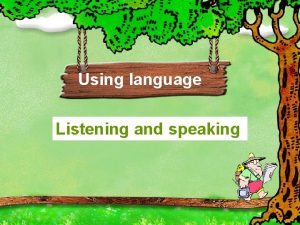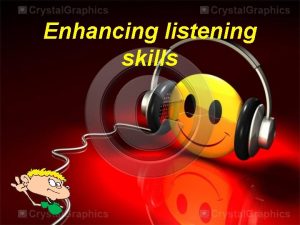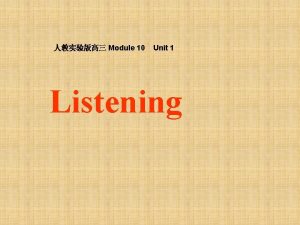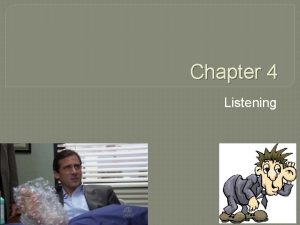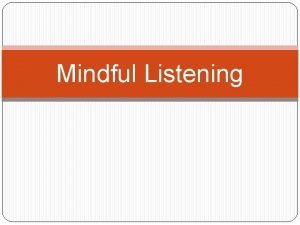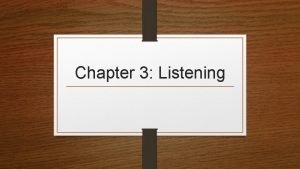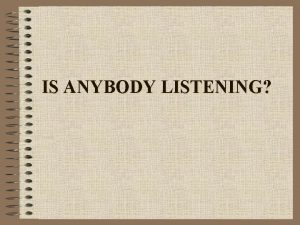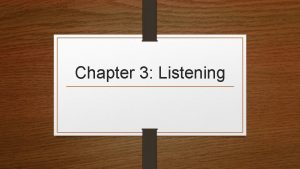You always listen you never dont hear Listening









![“It’s very much Maslow. They [the child] feels safe and looked after … they “It’s very much Maslow. They [the child] feels safe and looked after … they](https://slidetodoc.com/presentation_image_h/15156be4c970abbe64a94ae57ef98b5b/image-10.jpg)













- Slides: 23

“You always listen, you never don’t hear” Listening to MNS leaders and practitioners Carla Solvason and Rebecca Webb

Based upon research funded by TACTYC and carried out with Samantha Sutton-Tsang (UW)

“I'm amazed that people are still trying to feel convinced about what's the importance of a nursery school, because nurseries have demonstrated their effectiveness over so many years to so many people. ” Maintained Nursery School Leader”

“Attention is the rarest and purest form of generosity. ” Simone Wiel

• 115 MNS practitioners and leaders through survey • 21 interviews with MNS leaders • 6 nursery visits

ü The paradox of EY as the poor relation ü The passion of the MNS practitioner ü A source of pedagogical EY expertise ü The development of business acumen

“Nursery practitioners are regarded as lowlevel staff with low qualifications. Plenty have degrees and have invested years into CPD, but are still met with low paid and even degrading positions. Early years is so important to continued learning in a child’s life. Beginning a love of learning and engagement is fundamental to a happy society

“You have to believe in each and every one of those children… How could you not want to do the absolute very best, you can do, with what you've got? … Look at them [the children]. They're amazing. It’s the best job in the world and I wouldn’t want to do anything else…” “We've actually bought into this. Yeah, this is what we know is right. For children and families here. … I truly believe this isn’t a job,

“I have got staff who are paid parttime but work full-time. Because … they want to do it, and they know that the money just isn't there. It'd be really nice to be in a position where we just pay people for the job they're doing!”
![Its very much Maslow They the child feels safe and looked after they “It’s very much Maslow. They [the child] feels safe and looked after … they](https://slidetodoc.com/presentation_image_h/15156be4c970abbe64a94ae57ef98b5b/image-10.jpg)
“It’s very much Maslow. They [the child] feels safe and looked after … they don't have all those extrinsic worries. So they can just be a child and just play. And they don't have to worry ‘am I going to have some tea? ’ or, you know, ‘what's my mum going to be like tonight? ’

“They do come in predominantly below age related expectation …when they leave…including children with disabilities, 90% of them are where they should be; excluding children with disabilities, 96% are where they should be or above. ”

“…we often get children who've been turned away from setting after setting. And then, at some point, somebody says, ‘You know, who’ll support you? Our nursery school. ’” “We’ve become, somehow, a little specialist unit, but not, not in any official capacity. With parents, with health visitors. With referral agencies for children with high level autism. ”

“We actually want to be inclusive. And that actually, by being inclusive, all the children benefit. It's an inclusive society. So our nurture should reflect that…”

“…we had a little boy who was blind, so we all learned body signing. So instead of Makaton which is visual, like for ‘more’ he would bang his shoulder, and ‘finished’ he would bang on the table. . . And then things like his key person would have a certain perfume on her scarf that she wouldn't change, so that he could recognise her when he came in. We learned so much from him. ”

“We see some families go through some really terrible times… And it might have just been a smile in the morning or a hug in the afternoon. A ‘Come on, let's go and get a cup of tea. Let's go. What can I do? I'll put you in touch with the service…’ We can maybe do that. It’s huge. ”

“The demise of the Children Centre model has been catastrophic for families and outcomes. MNS should be properly funded to allow them to fulfil this role. ” “We are essentially doing the family support now. We are leading on early help plans, we are supporting parents… The stuff that I would have passed over to a family support worker, because it’s just out of our realm … we are now having to learn about housing, anything. ”

“…there’s a two-fold quality to maintained nurseries, which is that there is a constantly evolving pedagogy, an area of expertise, but also that support for the family and other settings. ”

“We have run 'Visitor Days' - training days for EY staff from provisions. Staff spend half a day in the nursery observing and being involved in the practice we deliver and have a short training session to consolidate what they have seen. The training has been oversubscribed and feedback suggests that what they have experienced has impacted on developing their practice…”

“You know, I realize what models work. No one ever does any work on what works. They never do that, you know? And that's sad, really, isn't it? Because they should, with the money that they had, they could have had 10 of these [an expanded MNS offering additional services], one in each district. Why didn’t they do it? ”

“Where will the vulnerable children and families go if maintained nurseries are unable to continue to provide this support? ”

“The thing that really concerns me is that once MNSs have gone, that level of expertise and social service will also… There's very specific expertise that's going to go to waste…”

“We're a prevention, rather than a cure. I mean, we have these very hard cases… because of the relationships [with families], you can stop them jumping off the cliff. And I think it's, it's not something you can quantify, because you can't say, how many of the children would have been on a child protection plan if we hadn't been here…”

References • Basford, J. (2019) ‘The Early Years Foundation Stage: Whose knowledge, • • Whose Values? ’, Education, 3 -13, 47 (7), p. p. 779 -783 Nutbrown, C (2013) Shaking the Foundations of Quality? Why ‘childcare’ policy must not lead to poor-quality early education and care. Available from: http: //www. crec. co. uk/docs/Shaking_the_foundations_of_quality. pdf Solvason, C. , Webb, R. and Sutton-Tsang, S. (2020) Evidencing the effects of maintained nursery schools' roles in Early Years sector improvements. Available at https: //tactyc. org. uk/research/ Solvason, Webb and Tsang (2020) What is left…? : The Implications of Losing Maintained Nursery Schools for Vulnerable Children and Families in England, Children and Society, https: //authorservices. wiley. com/api/pdf/full. Article/16752045 Wiel, S. (1942) Letter Joë Bousquet, 13 April 1942; in Simone Pétrement, Simone Weil: A Life (1976) tr. Raymond Rosenthal.
 Thou nature art my goddess
Thou nature art my goddess Dont ask dont tell political cartoon
Dont ask dont tell political cartoon Dont laugh at me dont call me names
Dont laugh at me dont call me names Listening pattern
Listening pattern While listening stage
While listening stage You hear me but are you listening
You hear me but are you listening Listen and circle a or b
Listen and circle a or b Core belief
Core belief Love never fails never gives up
Love never fails never gives up Matthew 13
Matthew 13 Hear ye definition
Hear ye definition Listen to the pouring rain
Listen to the pouring rain What happens to those who never hear the gospel
What happens to those who never hear the gospel You cant manage what you dont measure
You cant manage what you dont measure If you can't measure it you can't control it
If you can't measure it you can't control it Never listen to the nos
Never listen to the nos We are never never weary
We are never never weary If we had more rain our crops would grow faster
If we had more rain our crops would grow faster He never polishes his shoes, so he never looks smart
He never polishes his shoes, so he never looks smart Jesus is faithful he never fails
Jesus is faithful he never fails What runs but never walks has a mouth that never talks
What runs but never walks has a mouth that never talks Hierarchy for quadrilaterals
Hierarchy for quadrilaterals A source monitoring error
A source monitoring error What goes up but never comes down
What goes up but never comes down
